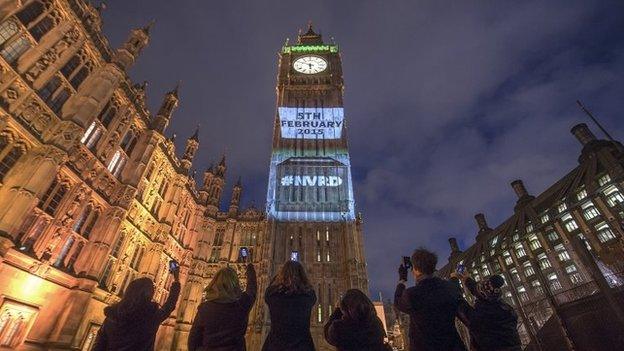Election 2015: Have you registered to vote?
- Published
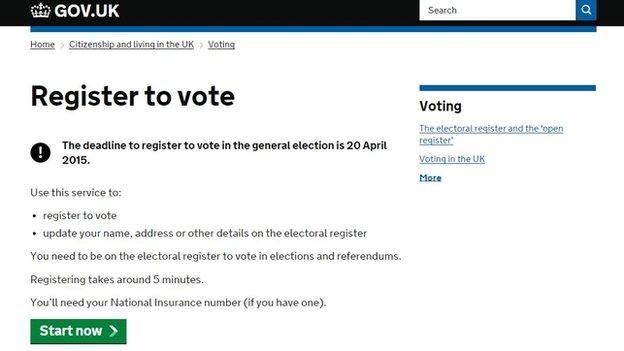
Political figures are on the campaign trail trying to win votes for the general election.
But other campaigns have been taking place to encourage people to register to vote before the deadline of 20 April.
The election projections show the outcome on 7 May is difficult to predict.
So the difference could be made by minority groups if they use the opportunity to register and vote.
Operation Black Vote
The campaigning group that fights for racial equality, Operation Black Vote (OBV), has been travelling around the country in an orange bus promoting voter registration especially to ethnic minorities.
The bus with its images of US civil rights activist Rosa Parks and black and Asian World War Two army personnel, has facilities to allow people to register on board.
OBV's director Simon Woolley says there is a disproportionate number of black and Asian people that have registered to vote.
According to OBV figures, in the 2010 election 18% of black and minority ethnic (BME) groups did not register to vote compared with 7% of white people. Of the BME groups - 50% of Africans, 20% of Caribbeans, and 15% of Asians were not registered.
"It's clear the people we have talked to are not apathetic to politics," says Simon.
"They are interested in education, health, politics and unemployment.
"But they are frustrated and angry because of the lack of representation in politics, so they consciously opt out."
OBV says they have reached a million people in the last eight weeks of campaigning, and that tens of thousands of people have registered on their bus.
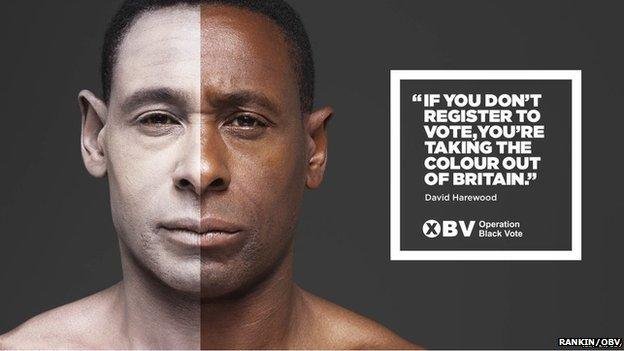
Actor David Harewood in Operation Black Vote's register to vote campaign
OBV has used black British celebrities to illustrate the cause.
The Homeland actor David Harewood, musician Tinie Tempah, and the former footballer Sol Campbell are featuring on posters.
Their faces have been whitened by make-up to show that without the black vote, the colour is taken out of British politics.
"We have great role models in these individuals and they wanted to give back to the community," says Simon.
He adds: "I'm impatient for fundamental change and I won't rest until people are judged by their ability and not by the colour of their skin."
Operation Disabled Vote
Inspired by Operation Black Vote, Operation Disabled Vote (ODV) was launched in November 2014 with the aim of aiding deaf and disabled people to register and vote.
The London-based group has been part of a national voter registration drive No Vote No Voice, external.
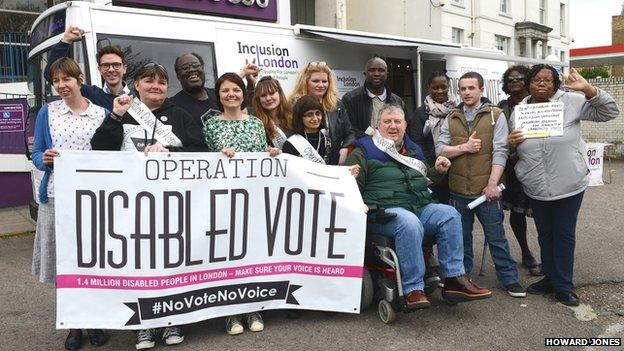
Operation Disabled Vote out and about promoting voter registration
ODV is touring the capital on a bus with deaf interpreters to provide help and information.
ODV's co-founder, Ellen Clifford, says there are many issues surrounding voter registration.
"Primarily, a lot of the information is online but some people have no access," she explains.
"Statistically disabled people, particularly with learning difficulties, have less online access than any other group."
ODV has found that people are interested in registering but they may not have their national insurance number to hand or they need to rely on family members for help.
In a Mencap, external survey, 64% of people with learning disabilities who were questioned said they did not vote in the last election.
Reasons included finding the process of registering too difficult and being turned away from polling stations.
Ellen says: "There is no legal duty for polling stations to be made wheelchair accessible. Polling officers can come out on the street with a ballot paper. But we don't think that's acceptable."
She adds that the biggest barrier is people thinking there is no point in voting because politicians have failed in representing the interests of deaf and disabled people.
Youth Media Agency - #XXVote
Young people, particularly women, are not big on voting.
Only 39% of women between 18-24 , externalvoted in the 2010 general election, making them the demographic least likely to vote.
After a consultation, the Youth Media Agency recognised it was more of an issue than previously thought.
The agency's Hannah Vincent says: "We found there was a massive level of apathy and young women were overwhelmed by politics."
To help redress this, the agency used the #XXVote hashtag in social media and with the help of crowdspeaking platform Thunderclap, external their message reached 1.6 million people.
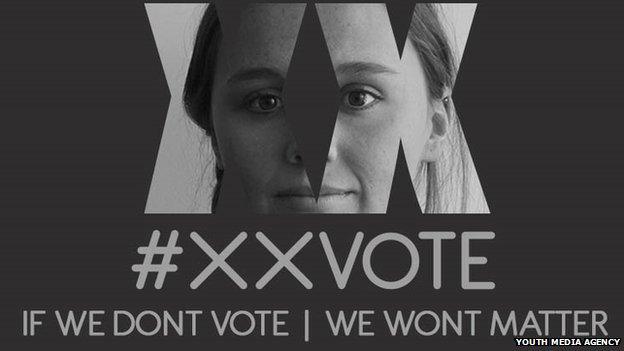
Youth Media Agency's campaign by young women for young women
The team also turned to the big screen to spread the word.
Hannah Vincent directed a film, external that was made by young women for young women, which shows the relevance of politics in young women's everyday lives and also emphasises the importance of voter participation.
National Union of Students - #RegAFriend
The National Union of Students (NUS) has used various methods to inform students about registering.
"Some didn't realise they had to register," says the NUS President Toni Pearce.
"They thought because they pay their taxes and that the people know who they are, they would automatically be able to vote."
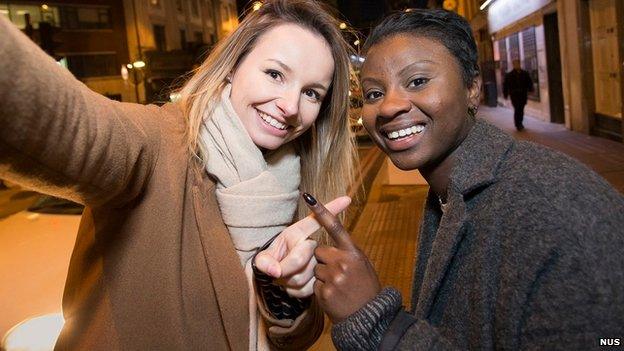
The National Union of Students campaign #RegAFriend to get a friend to register to vote
#RegAFriend is the latest NUS online campaign targeting students to encourage their friends to register.
Students are taking selfies with friends crossing fingers and adding their photos with the #RegAFriend hashtag online.
"It's an opportunity to talk about politics as well as people taking responsibility for others to register rather than focus individually," says Toni.
"They care and are interested in many issues. They are concerned about the cost of living for students which is really high, and they are worried about getting a job and if it pays enough to pay back their student fees."
No matter how seemingly wacky the idea, many students have heeded the campaign's message.
The University of East Anglia ran a Goats for Votes registration drive.
"The idea was that if students registered to vote, they can get a play with some goats," explained Toni, who added that the idea led to 2,000 students signing up.
"Students are a force to be reckoned with and it is not just the NUS talking about issues, so are they."
Shout Out UK, a news network for young people has won a commission for a youth leaders debate, external that will be shown on Channel 4 on 28 April.
- Published15 April 2015
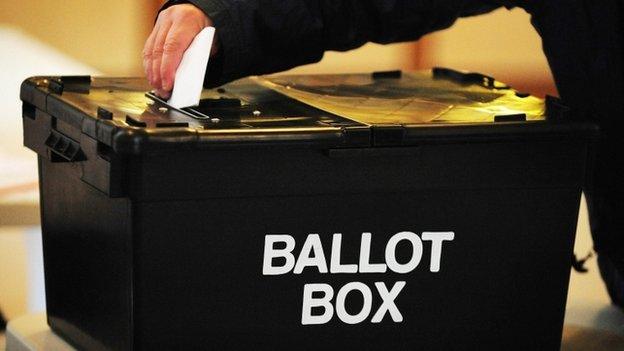
- Published8 April 2015
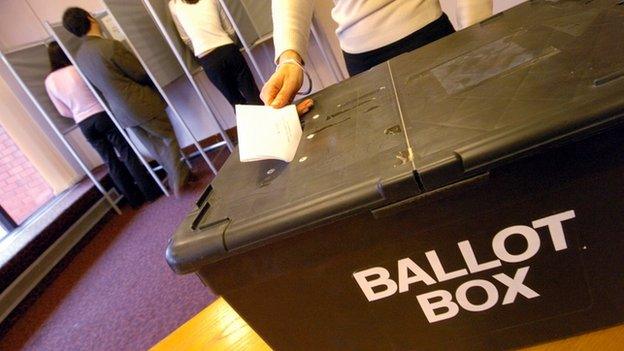
- Published28 March 2015
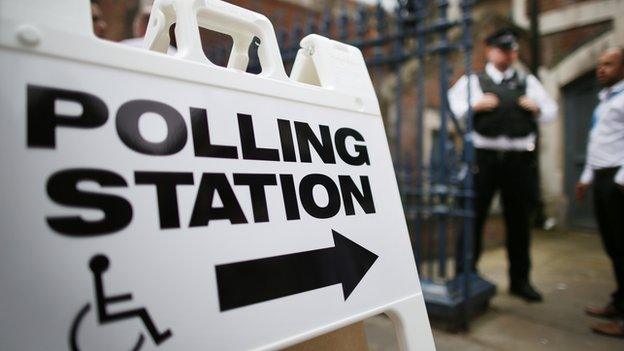
- Published13 March 2015
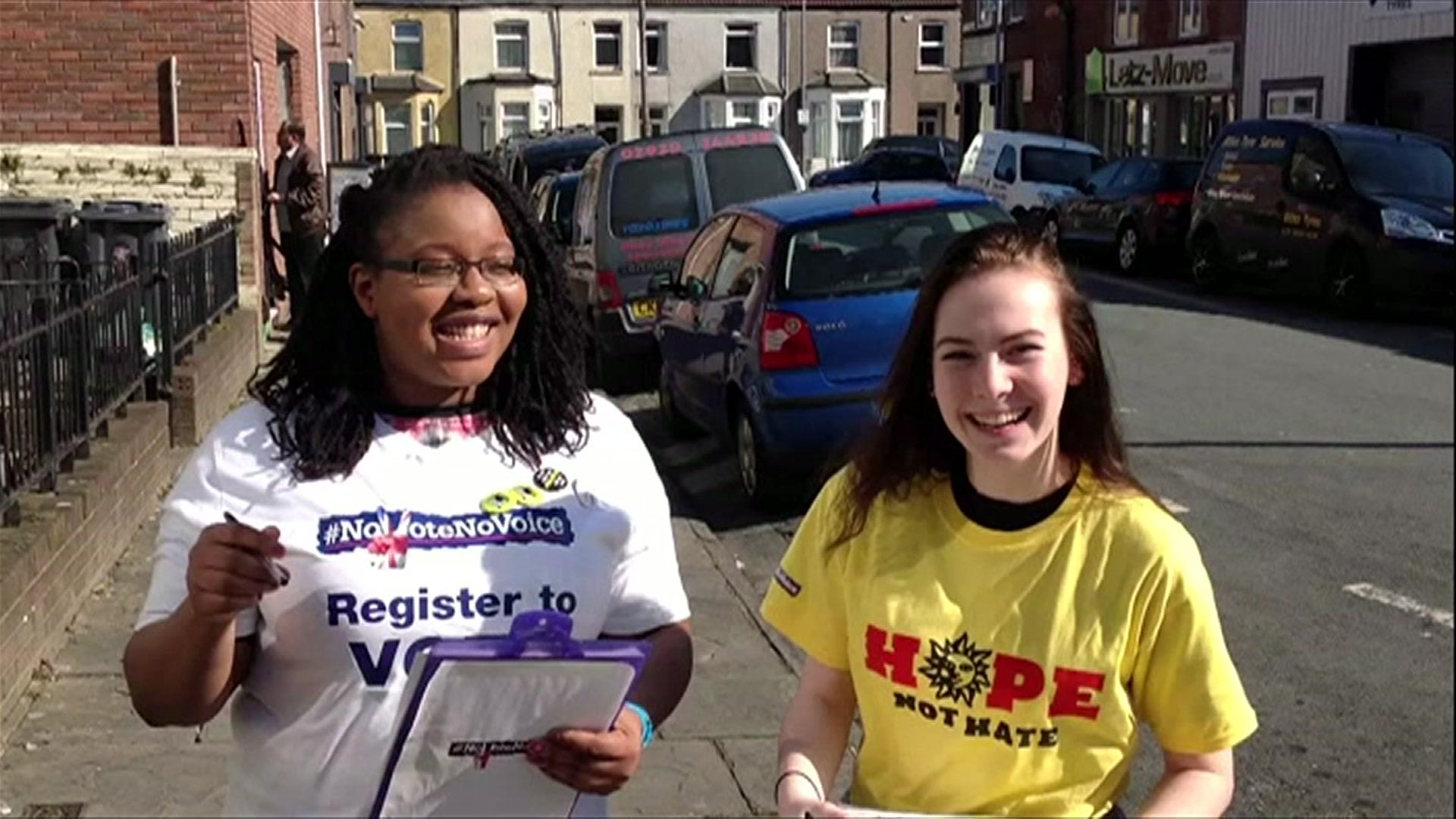
- Published5 February 2015
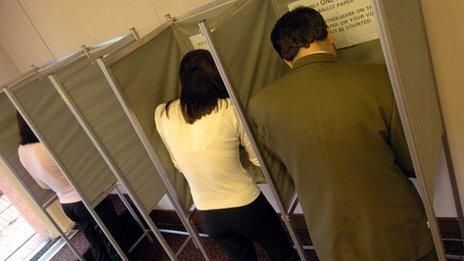
- Published5 February 2015
